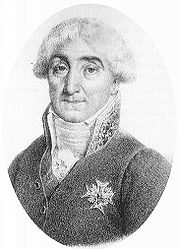
Raymond Desèze
Encyclopedia

French people
The French are a nation that share a common French culture and speak the French language as a mother tongue. Historically, the French population are descended from peoples of Celtic, Latin and Germanic origin, and are today a mixture of several ethnic groups...
advocate
Advocate
An advocate is a term for a professional lawyer used in several different legal systems. These include Scotland, South Africa, India, Scandinavian jurisdictions, Israel, and the British Crown dependencies of Jersey, Guernsey and the Isle of Man...
. Together with François Tronchet and Malesherbes
Guillaume-Chrétien de Lamoignon de Malesherbes
Guillaume-Chrétien de Lamoignon de Malesherbes , often referred to as Malesherbes or Lamoignon-Malesherbes, was a French statesman, minister, and afterwards counsel for the defence of Louis XVI.-Biography:...
, he defended Louis XVI
Louis XVI of France
Louis XVI was a Bourbon monarch who ruled as King of France and Navarre until 1791, and then as King of the French from 1791 to 1792, before being executed in 1793....
, when the king was brought before the Convention for trial.
Biography
de Sèze was born in BordeauxBordeaux
Bordeaux is a port city on the Garonne River in the Gironde department in southwestern France.The Bordeaux-Arcachon-Libourne metropolitan area, has a population of 1,010,000 and constitutes the sixth-largest urban area in France. It is the capital of the Aquitaine region, as well as the prefecture...
, Aquitaine
Aquitaine
Aquitaine , archaic Guyenne/Guienne , is one of the 27 regions of France, in the south-western part of metropolitan France, along the Atlantic Ocean and the Pyrenees mountain range on the border with Spain. It comprises the 5 departments of Dordogne, :Lot et Garonne, :Pyrénées-Atlantiques, Landes...
, and studied in the famous law school of that city. He gained a reputation for remarkable passion and persuasivness, and came to prominence in 1789 when he defended the Baron de Bensenval against charges of high treason. When, at forty-four, he was called out of retirement to aid the last push of the kings defence, he was considered one of the best lawyers in the kingdom. Though he had to prepare his defence arguments in a short amount of time, his brilliance shone through in a first draft that, although moving, Louis rejected as too rhetorical, saying, "I do not want to play on their (the Convention's) feelings". When the time for the real defence came, despite having had no sleep for over four days, he pled the king's case for three hours, arguing eloquently yet discreetly that the revolution spare his life. Beginning with a description of why the charges were invalid (under the terms of the constitution of 1791 Louis, as king, was immune from prosecution), he attacked the right of Convention to stand as judge and jury. Finally, he moved to a rejection of the charges in the acte enonciatif drawn up by the constitution charge by charge, with a royalist history of the revolution, portraying Louis as 'the restorer of French Liberty". He finished, like many of the set-piece speeches of the revolution, with an appeal to history:
Jean-Paul Marat
Jean-Paul Marat
Jean-Paul Marat , born in the Principality of Neuchâtel, was a physician, political theorist, and scientist best known for his career in France as a radical journalist and politician during the French Revolution...
, the démagogue of the sans-culottes, was favourably impressed, and declared: "de Séze read a long speech made with a great deal of art". The Commune, the most violent of the factions at the time, described the speech as "very adroit". Nevertheless, the case was lost, and the king was sent to the guillotine
Guillotine
The guillotine is a device used for carrying out :executions by decapitation. It consists of a tall upright frame from which an angled blade is suspended. This blade is raised with a rope and then allowed to drop, severing the head from the body...
. de Sèze himself was also imprisoned during the revolution, but he managed to elude the scaffold. After release upon the fall of Robespierre, he disappeared from public life, serving neither the Directory
French Directory
The Directory was a body of five Directors that held executive power in France following the Convention and preceding the Consulate...
nor the Napoleonic government, both of which he saw as illegitimate. Upon the return of the Bourbons
House of Bourbon
The House of Bourbon is a European royal house, a branch of the Capetian dynasty . Bourbon kings first ruled Navarre and France in the 16th century. By the 18th century, members of the Bourbon dynasty also held thrones in Spain, Naples, Sicily, and Parma...
he was made a peer, as well as a judge and a member of the French Academy, before dying at the age of seventy eight.

